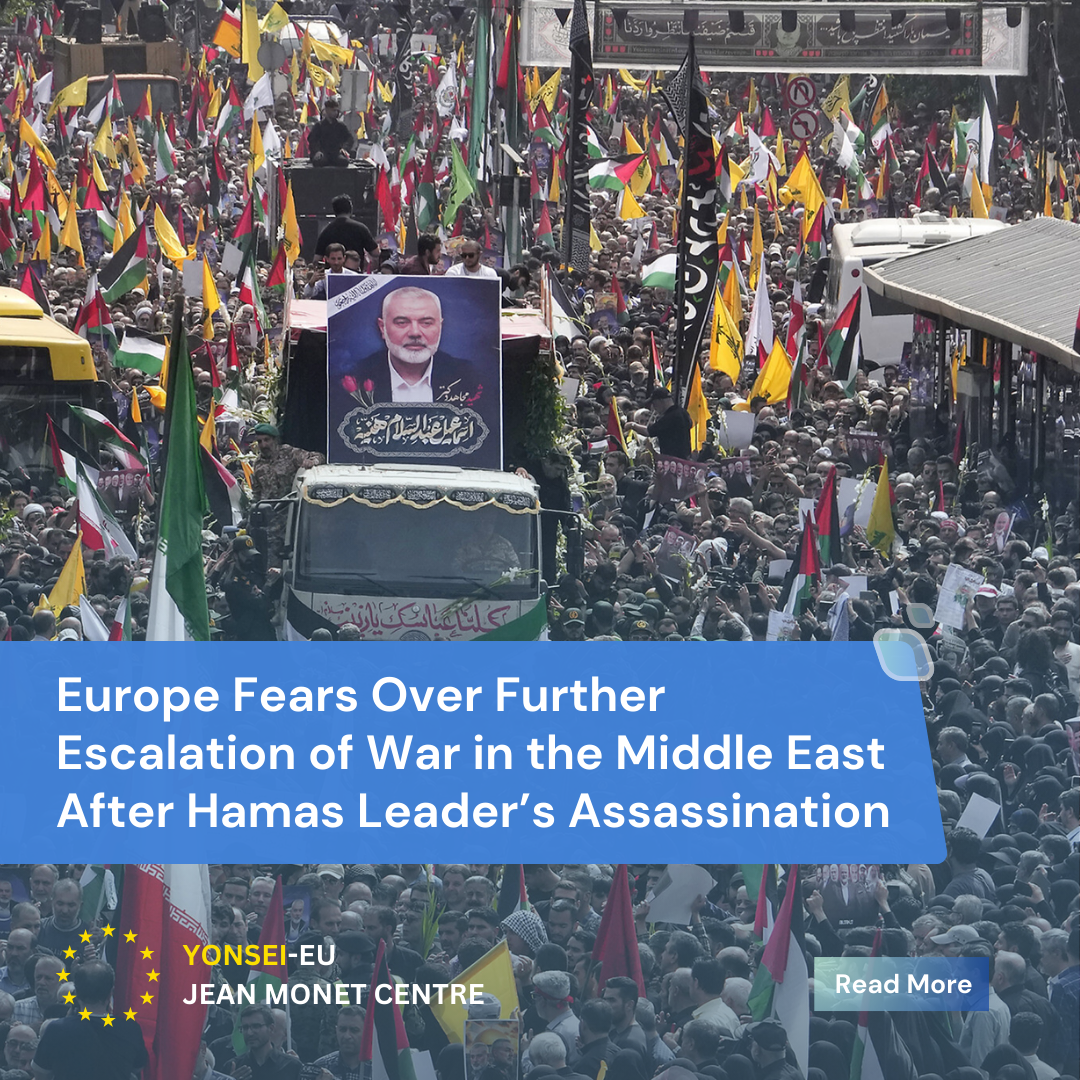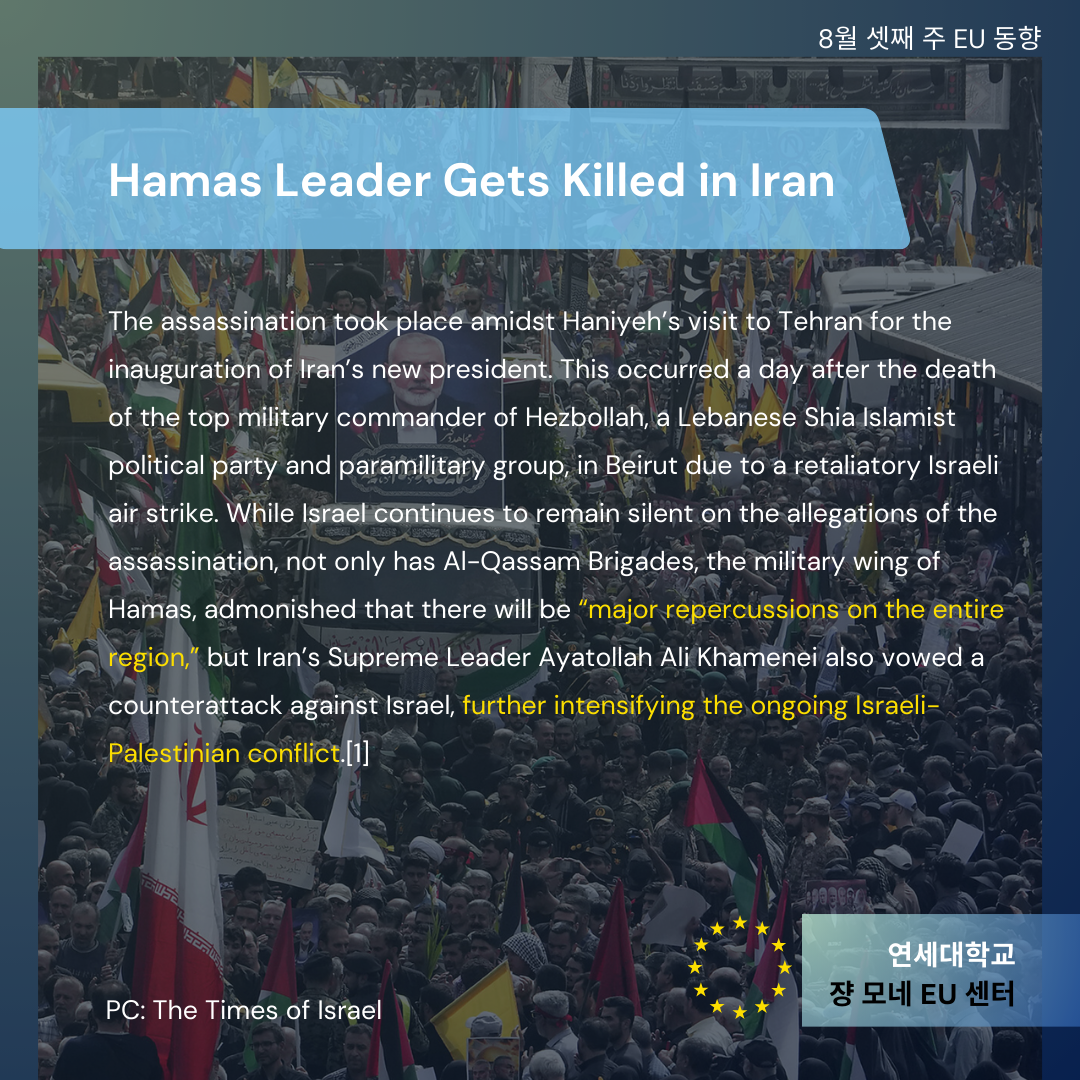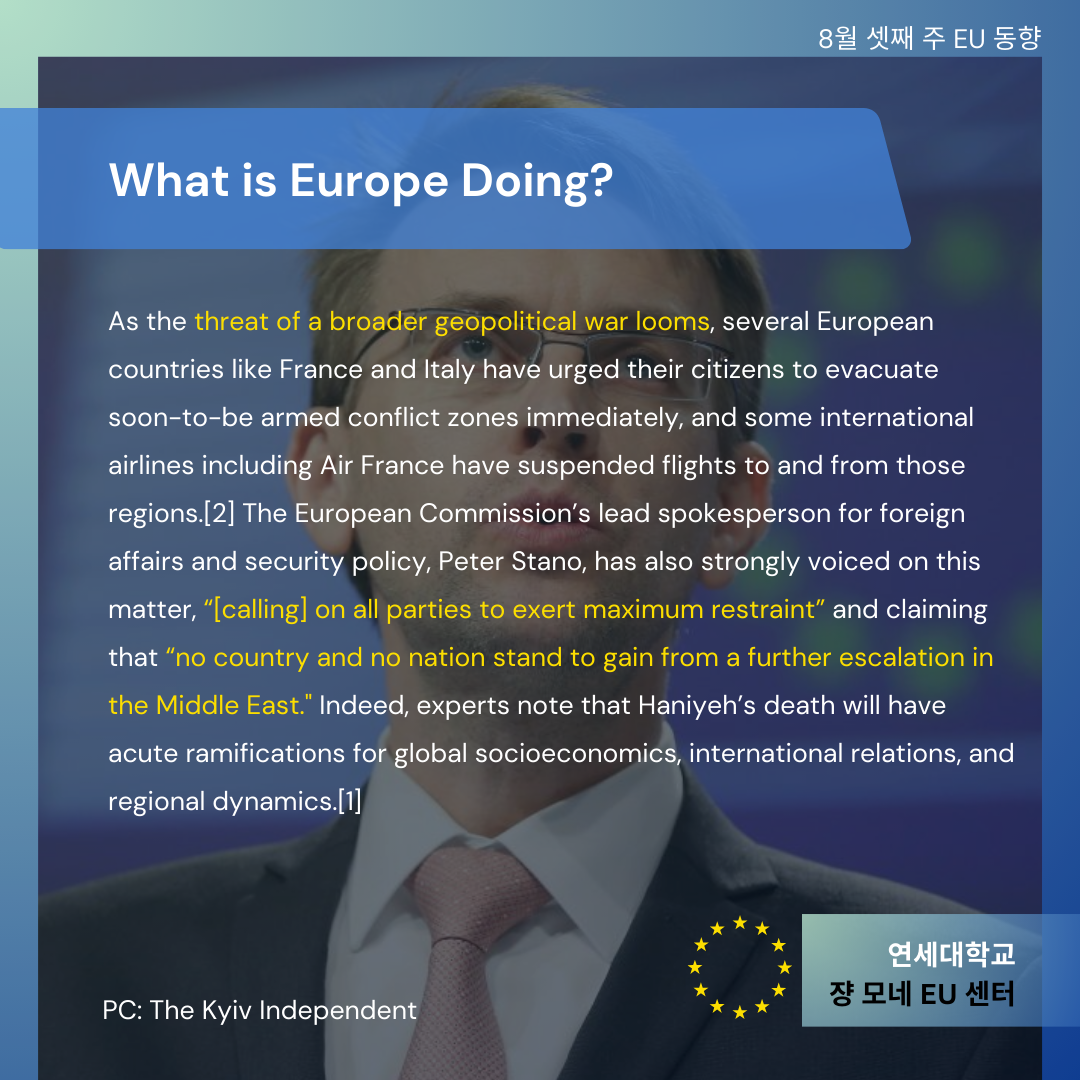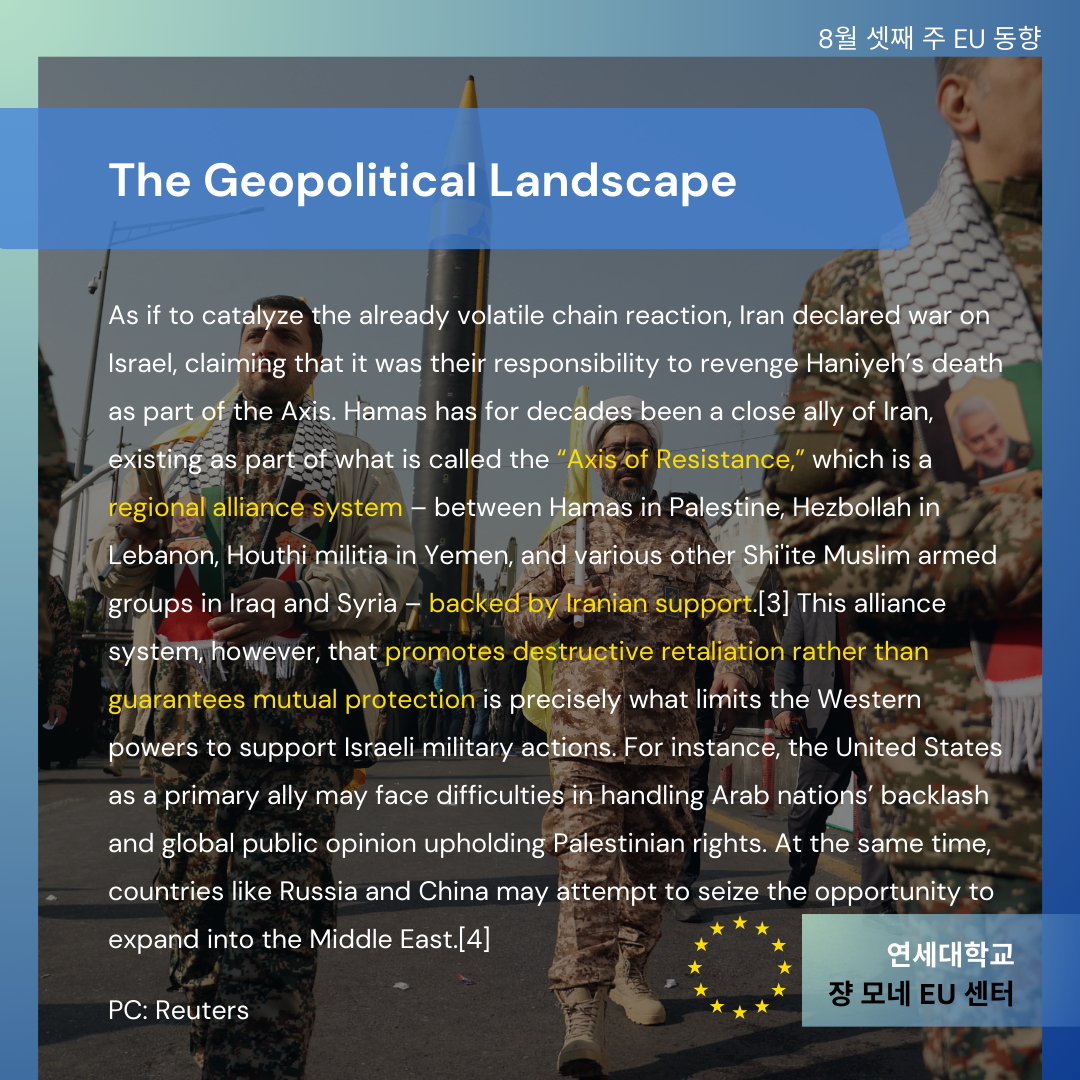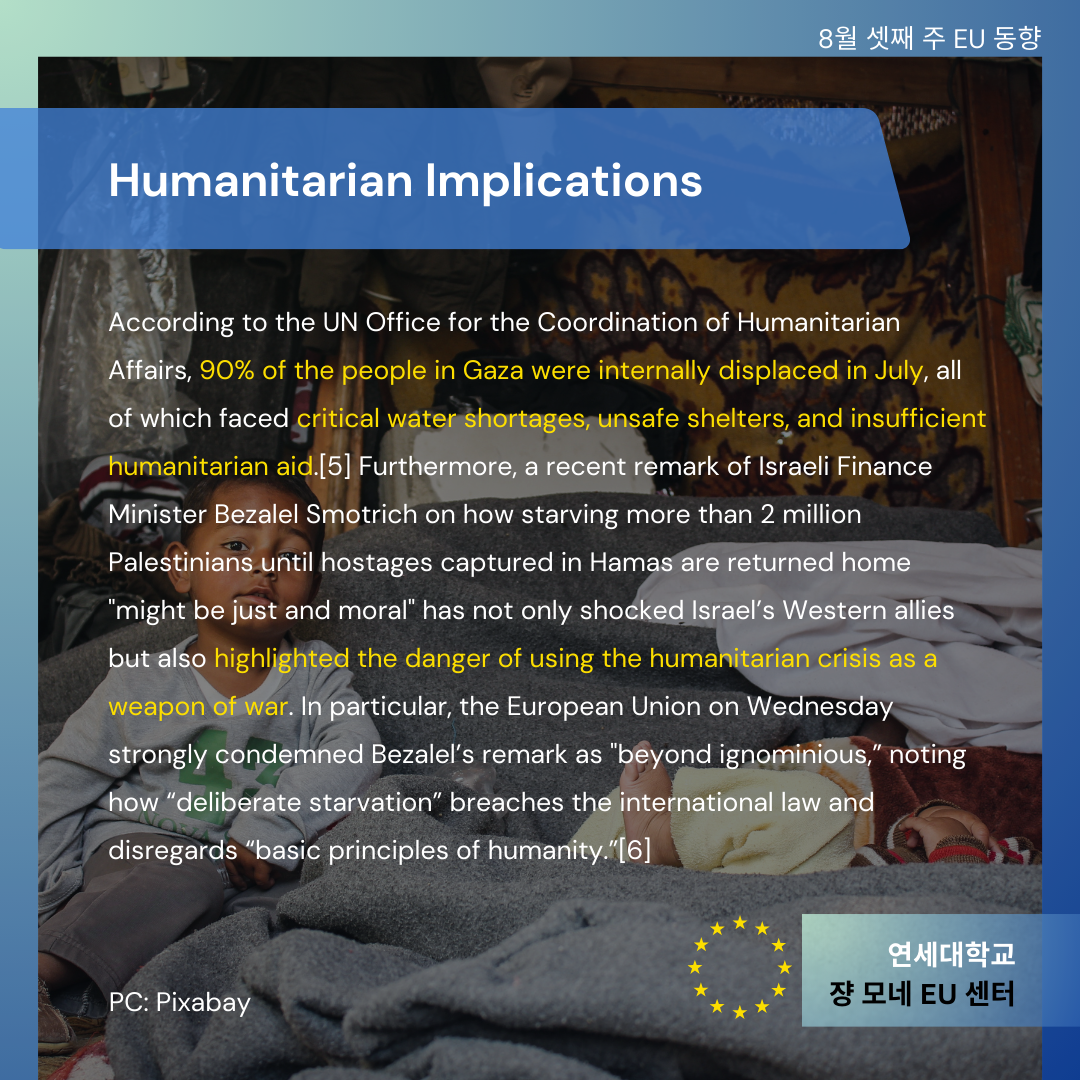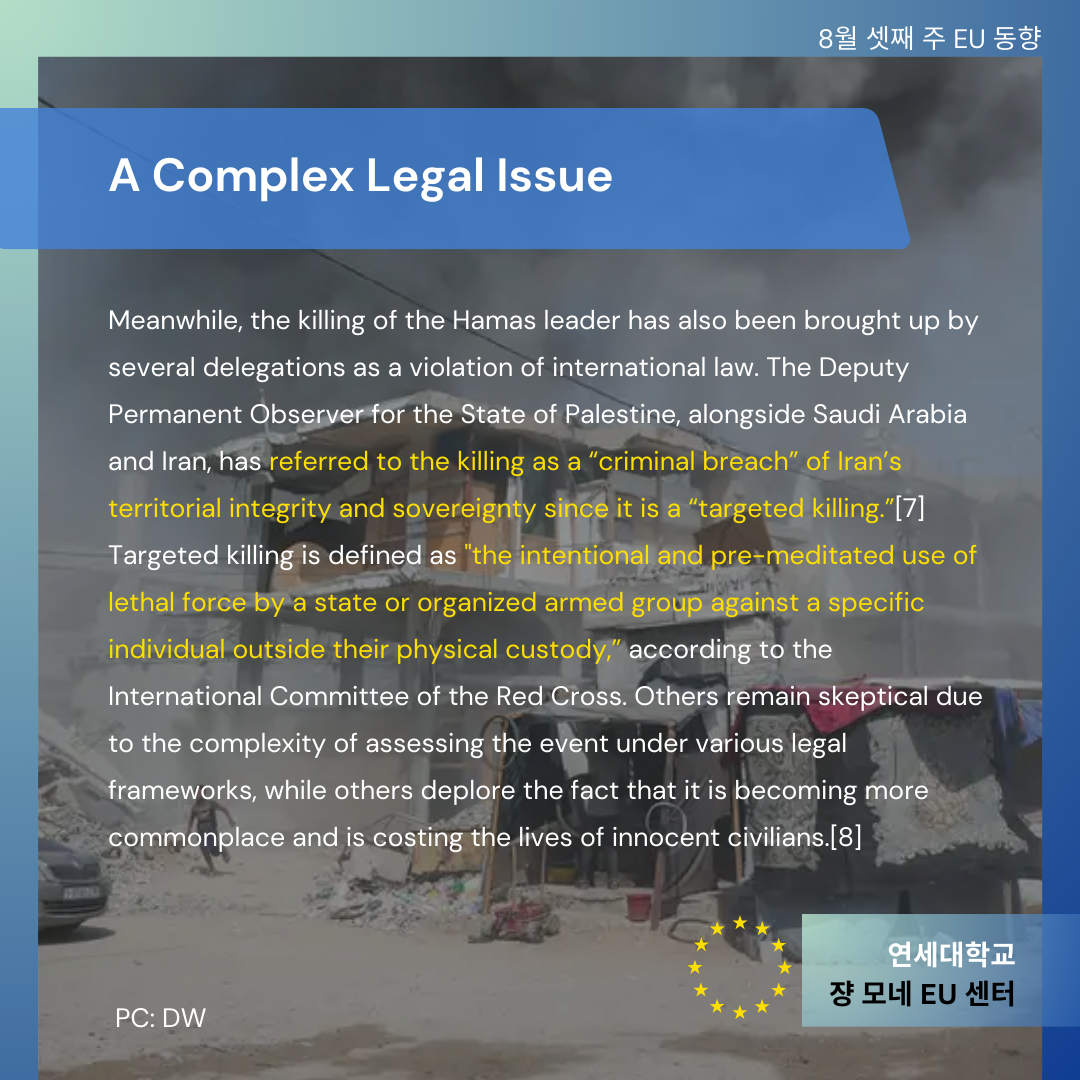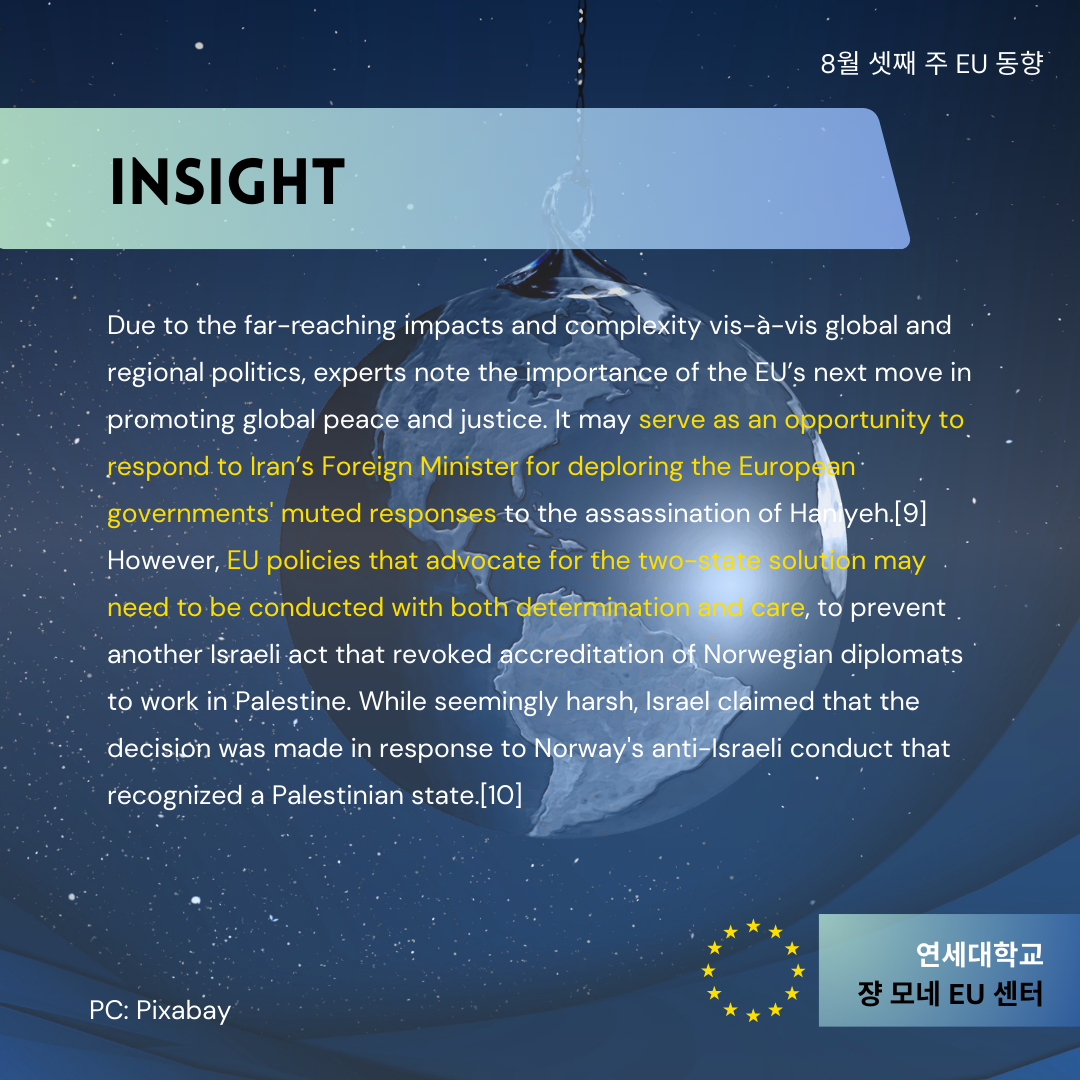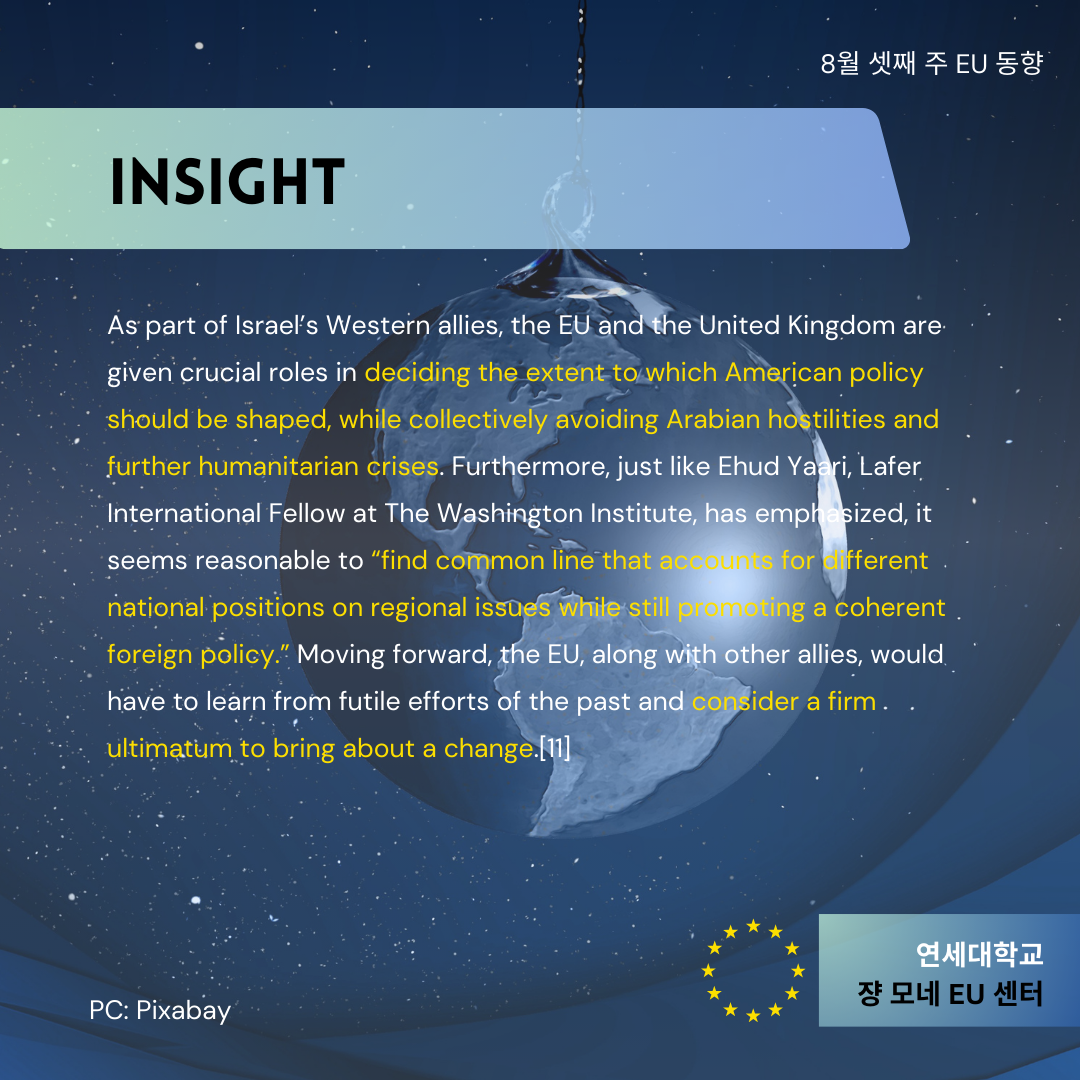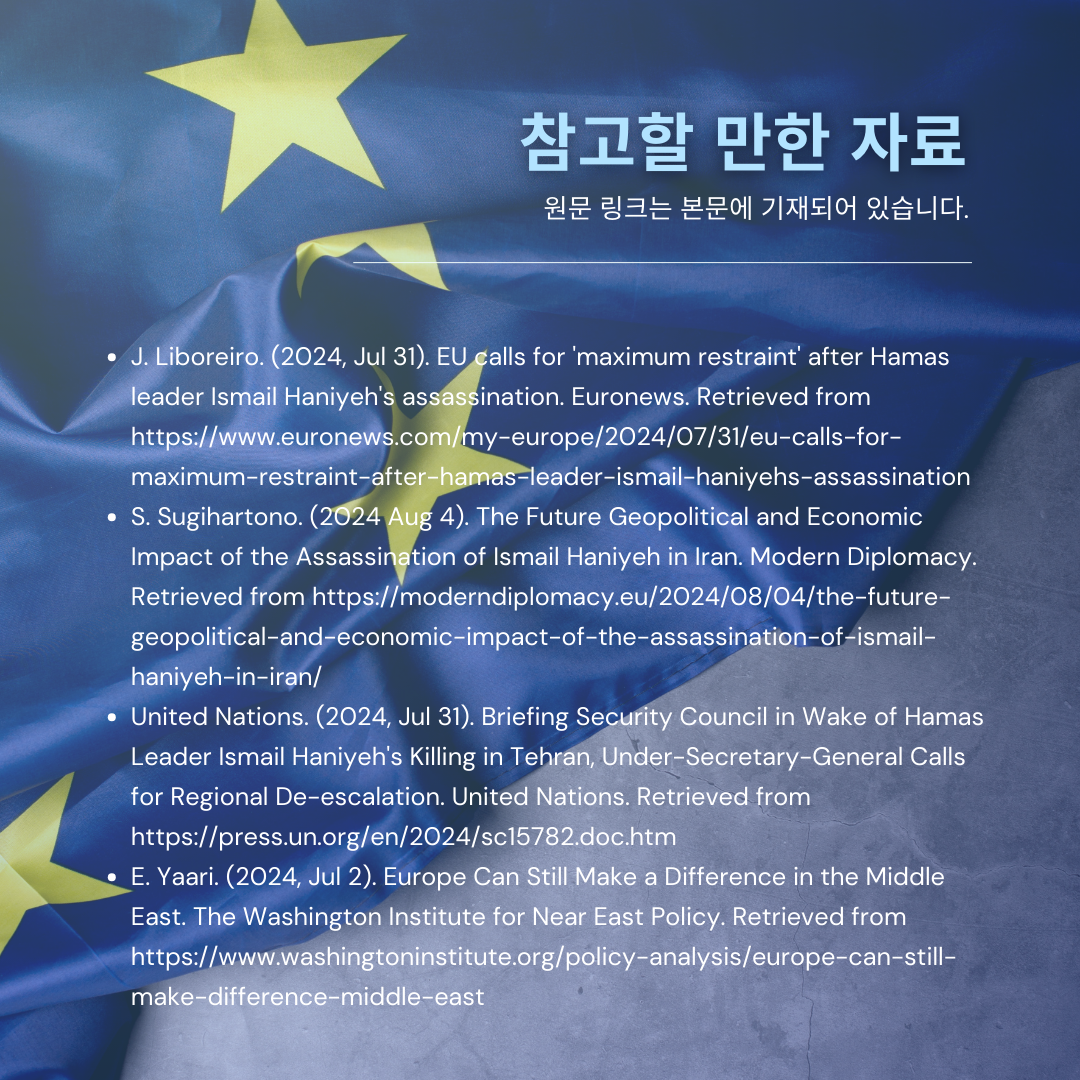YONSEI-EU Jean Monnet Centre
EU와 ASIA를 연결하는 네트워크 허브
EU 동향
EU 관련 최신 현안 이슈 및 동향을 분석하고 시사점을 제시합니다.
Europe Fears Over Further Escalation of War in the Middle East After Hamas Leader’s Assassination
Following the assassination of Ismail Haniyeh, chairman of the Hamas Political Bureau, on July 31st, the tensions of a broader war seem to inflame across and beyond the Middle East. While Israel continues to remain silent on the allegations of the assassination, not only has Al-Qassam Brigades, the military wing of Hamas, admonished that there will be “major repercussions on the entire region,” but Iran’s Supreme Leader Ayatollah Ali Khamenei also vowed a counterattack against Israel, further intensifying the ongoing Israeli-Palestinian conflict.[1] As the threat of a broader geopolitical war looms, several European countries like France and Italy have urged their citizens to evacuate soon-to-be armed conflict zones immediately, and some international airlines including Air France have suspended flights to and from those regions.[2] The European Commission’s lead spokesperson for foreign affairs and security policy, Peter Stano, has also strongly voiced on this matter, “[calling] on all parties to exert maximum restraint” and claiming that “no country and no nation stand to gain from a further escalation in the Middle East." Indeed, experts note that Haniyeh’s death will have acute ramifications for global socioeconomics, international relations, and regional dynamics.[1] At this pivotal juncture, it is upon Europe, among other counterparts, to contribute to de-escalating a war potent enough to stupor the world.
The assassination took place amidst Haniyeh’s visit to Tehran for the inauguration of Iran’s new president. This occurred a day after the death of the top military commander of Hezbollah, a Lebanese Shia Islamist political party and paramilitary group, in Beirut due to a retaliatory Israeli air strike.[1] As if to catalyze the already volatile chain reaction, Iran declared war on Israel, claiming that it was their responsibility to revenge Haniyeh’s death as part of the Axis. Hamas has for decades been a close ally of Iran, existing as part of what is called the “Axis of Resistance,” which is a regional alliance system – between Hamas in Palestine, Hezbollah in Lebanon, Houthi militia in Yemen, and various other Shi'ite Muslim armed groups in Iraq and Syria – backed by Iranian support.[3] This alliance system, however, that promotes destructive retaliation rather than guarantees mutual protection is precisely what limits the Western powers to support Israeli military actions. For instance, the United States as a primary ally may face difficulties in handling Arab nations’ backlash and global public opinion upholding Palestinian rights. At the same time, countries like Russia and China may attempt to seize the opportunity to expand into the Middle East. Amidst this power struggle between world powers and the possibility of massive flights towards the northern shores of the Mediterranean, Europe has been tasked with determining a specific mechanism and extent to which they should help shape American policy while maintaining its efforts for the Middle East Peace Process. It also seems imperative to reassess its long-term energy purchase strategies to mitigate risks of instability in oil supply chains, especially since several European countries enjoy strong economic ties to the Middle Eastern region, which is a critical hub for oil production.[4]
On top of ramifications for global geopolitics are the concerning levels of war crimes being persistently perpetrated in the Gaza region. According to the UN Office for the Coordination of Humanitarian Affairs, 90% of the people in Gaza were internally displaced in July, all of which faced critical water shortages, unsafe shelters, and insufficient humanitarian aid.[5] This is likely to worsen in the coming months as the assassination ignited pathways for a broader war. Furthermore, a recent remark of Israeli Finance Minister Bezalel Smotrich on how starving more than 2 million Palestinians until hostages captured in Hamas are returned home "might be just and moral" has not only shocked Israel’s Western allies but also highlighted the danger of using the humanitarian crisis as a weapon of war. In particular, the European Union on Wednesday strongly condemned Bezalel’s remark as "beyond ignominious,” noting how “deliberate starvation” breaches the international law and disregards “basic principles of humanity.”[6]
Meanwhile, the killing of the Hamas leader has also been brought up by several delegations as a violation of international law. The Deputy Permanent Observer for the State of Palestine, alongside Saudi Arabia and Iran, has referred to the killing as a “criminal breach” of Iran’s territorial integrity and sovereignty since it is a “targeted killing.”[7] Targeted killing is defined as "the intentional and pre-meditated use of lethal force by a state or organized armed group against a specific individual outside their physical custody,” according to the International Committee of the Red Cross. Others remain skeptical due to the complexity of assessing the event under various legal frameworks, while others deplore the fact that it is becoming more commonplace and is costing the lives of innocent civilians.[8]
Due to the far-reaching impacts and complexity vis-à-vis global and regional politics, experts note the importance of the EU’s next move in promoting global peace and justice. It may serve as an opportunity to respond to Iran’s Foreign Minister for deploring the European governments' muted responses to the assassination of Haniyeh.[9] However, EU policies that advocate for the two-state solution may need to be conducted with both determination and care, to prevent another Israeli act that revoked accreditation of Norwegian diplomats to work in Palestine. While seemingly harsh, Israel claimed that the decision was made in response to Norway's anti-Israeli conduct that recognized a Palestinian state.[10]
As part of Israel’s Western allies, the EU and the United Kingdom are given crucial roles in deciding the extent to which American policy should be shaped, while collectively avoiding Arabian hostilities and further humanitarian crises. Furthermore, just like Ehud Yaari, Lafer International Fellow at The Washington Institute, has emphasized, it seems reasonable to “find common line that accounts for different national positions on regional issues while still promoting a coherent foreign policy.” Moving forward, the EU, along with other allies, would have to learn from futile efforts of the past and consider a firm ultimatum to bring about a change.[11]

[1] J. Liboreiro. (2024, Jul 31). EU calls for 'maximum restraint' after Hamas leader Ismail Haniyeh's assassination. Euronews. Retrieved from https://www.euronews.com/my-europe/2024/07/31/eu-calls-for-maximum-restraint-after-hamas-leader-ismail-haniyehs-assassination
[2] Reuters. (2024, Aug 4). France and Italy urge citizens to leave Lebanon due to security risks. Reuters. Retrieved from https://www.reuters.com/world/france-invites-its-citizens-leave-lebanon-due-military-risks-2024-08-04/
[3] Reuters. (2024, Aug 5). What is Iran's 'Axis of Resistance'? Reuters. Retrieved from https://www.reuters.com/world/middle-east/what-is-irans-axis-resistance-2024-08-05/
[4] S. Sugihartono. (2024 Aug 4). The Future Geopolitical and Economic Impact of the Assassination of Ismail Haniyeh in Iran. Modern Diplomacy. Retrieved from https://moderndiplomacy.eu/2024/08/04/the-future-geopolitical-and-economic-impact-of-the-assassination-of-ismail-haniyeh-in-iran/
[5] OCHA. (2024, Jul 5). Humanitarian Situation Update #187 | Gaza Strip. reliefweb. Retrieved from https://reliefweb.int/report/occupied-palestinian-territory/humanitarian-situation-update-187-gaza-strip-enarhe
[6] Euronews with AP. (2024, Aug 8). Western allies condemn Israeli finance minister's remarks that starving Gaza may be justified. Euronews. Retrieved from https://www.euronews.com/2024/08/08/western-allies-condemn-israeli-finance-ministers-remarks-that-starving-gaza-may-be-justifi
[7] United Nations. (2024, Jul 31). Briefing Security Council in Wake of Hamas Leader Ismail Haniyeh's Killing in Tehran, Under-Secretary-General Calls for Regional De-escalation. United Nations. Retrieved from https://press.un.org/en/2024/sc15782.doc.htm
[8] C. Schaer. (2024, Aug 1). Israel-Hamas: Are 'targeted killings' legal? Deutsche Welle. Retrieved from https://www.dw.com/en/israel-hamas-are-targeted-killings-legal/a-69832571
[9] Tasnim News Agency. (2024, Aug 5). Europe’s Refusal to Condemn Haniyeh Assassination Questionable: Baqeri. Tasnim News Agency. Retrieved from https://www.tasnimnews.com/en/news/2024/08/05/3134357/europe-s-refusal-to-condemn-haniyeh-assassination-questionable-baqeri
[10] Euronews with AP. (2024, Aug 8). Israel revokes accreditation of Norwegian diplomats to Palestinian areas. Euronews. Retrieved from https://www.euronews.com/2024/08/08/israel-revokes-accreditation-of-norwegian-diplomats-to-palestinian-areas
[11] E. Yaari. (2024, Jul 2). Europe Can Still Make a Difference in the Middle East. The Washington Institute for Near East Policy. Retrieved from https://www.washingtoninstitute.org/policy-analysis/europe-can-still-make-difference-middle-east
